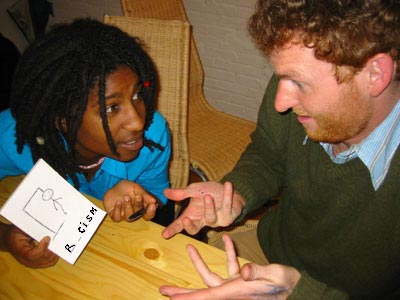My father was in the 332nd Fighter Group of which the 99th Fighter Squadron was part.
First of all, a quible that my father always corrected. It is a bit unfair to always talk about the Tuskegee airmen, rather than the 332nd Fighter Group. Usually the term is meant to apply to the first squadron of fighter pilots trained at Tuskegee and assigned to the command of African American Army Air Force General Benjamin O. Davis, as the 99th Fighter Squadron. But after the 99th proved their prowess (despite vicious criticism) General Marshall expanded the black pilot program to an entire fighter group, the 332nd. Moreover, this group included not just pilots, but mechanics, intelligence, medical corp -- every other function you would expect in a large fighter group, and all African American staffed and led. My father was a corporal in the 332nd.
There was a lot of officer/enlisted man comraderie, and after the war, my father stayed in touch with some of the officers as well as many fellow enlisted men. One night when I was in college, nearly 30 years ago, my uncle from California was in town, at the time still in the Air Force, and my father and mother had a dinner party. A 332nd pilot they both new attended.
He told me the story of a mission over Germany. Remember, the 332nd consisted of fighter pilots who often escorted bomber groups. Bomber groups were still segregated and entirely white. Bombers were much larger planes with longer range, and so they would pick up their fighter escorts closer to the targets. Although the bomber group commander was in overall command of the mission, it was up to the fighter squadron commander to instruct the bomber group commander when the mission had to end because the fighters would run out of fuel first.
The fighter squadron, of which this guest was a pilot, heard the radio trafic in which the black fighter squadron leader told the bomber group that it was time to turn around. The bomber group commander said over the radio he wasn't taking commands from a nigger and stayed over the target area. The fighters had no choice but to stay with the bombers.
The bombers finally decided to turn back. According to this dinner guest almost every fighter pilot ran out of fuel before reaching their bases in Italy, and crashed. He himself ran out of fuel a few miles from base and managed to glide to base. As he told this story, we were sitting next to a table lamp. I'll never forget what he said next:
"See this face? This is not the face I had when I went into the war. I glided in, but without power I crashed on the runway and my head went through the cockpit, and the glass shredded my face."
As he leaned into the lamp light I could see that his face was lightly striped with scars running from the front of his fact to the back of his head. He continued:
"I was in the hospital till the end of the war. After the war, all us black pilots were given the choice of either resigning our commission with officer's rank or being demoted to enlisted men, because the Air Force was not going to have any more black pilots. I resigned with my officer's rank. But when the Korean War began, they called me up and I went back into the Air Force as a pilot and officer."
DU moderators generally do not allow discussion of racism, so expect this post to be locked and deleted.
